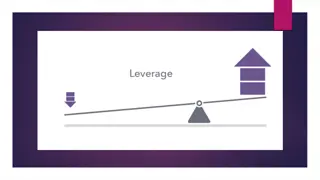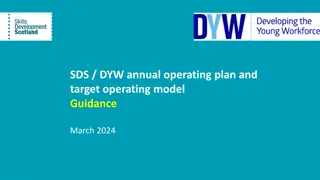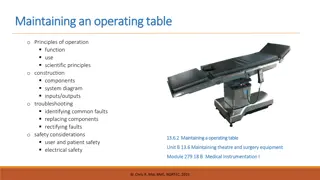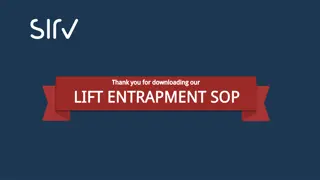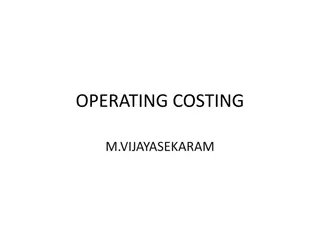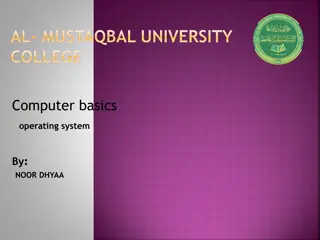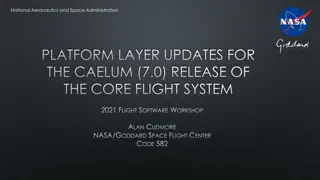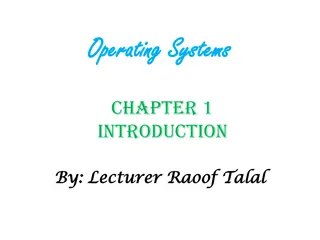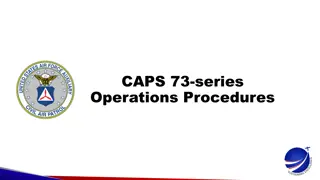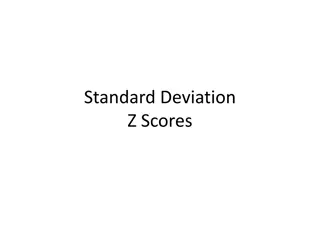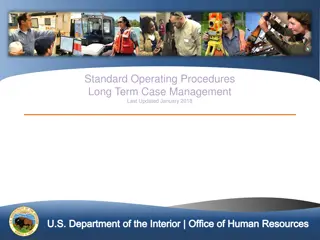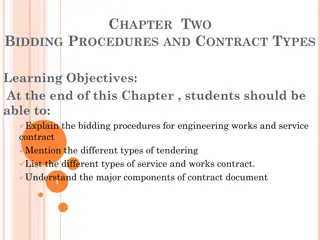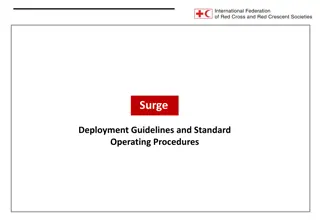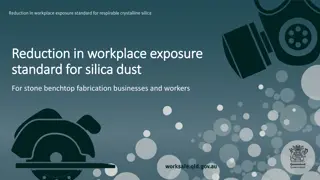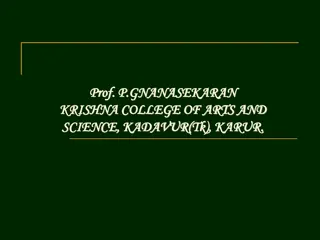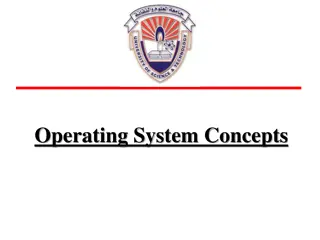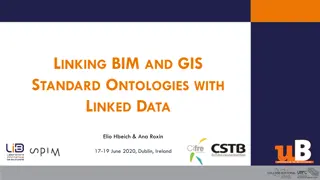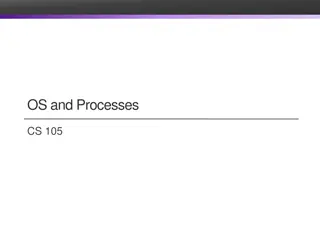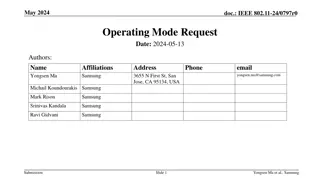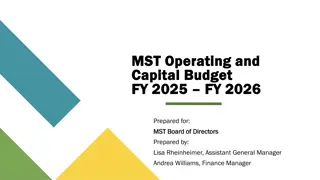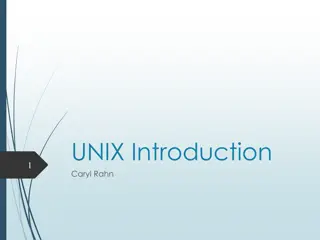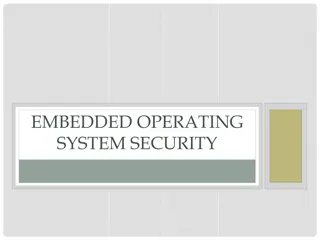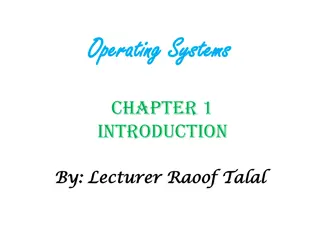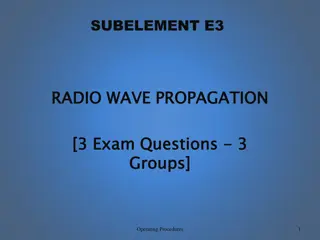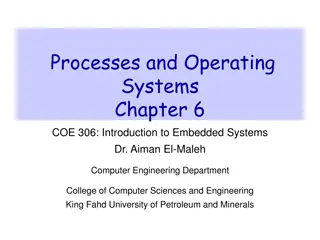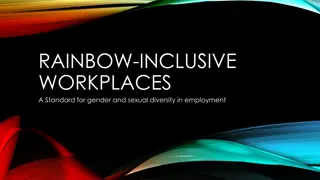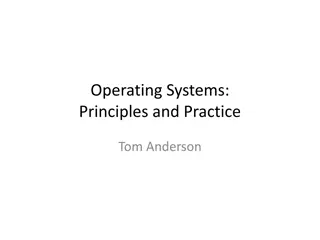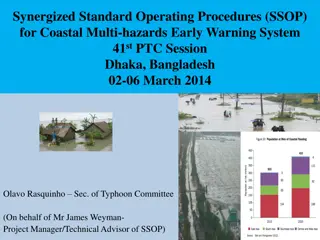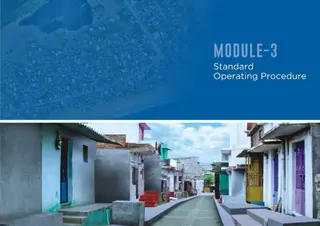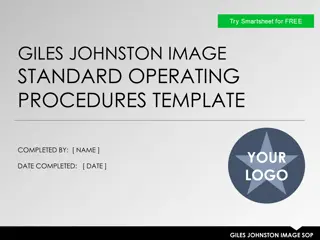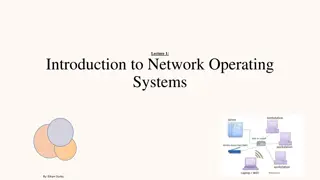Understanding Leverage and Operating Leverage in Financial Management
Leverage in financial management refers to using assets or funds with fixed costs to analyze the impact of debt and equity mix on shareholder returns and risk. Operating leverage focuses on leveraging fixed operating costs to amplify profit changes with sales variations, measured by the degree of op
2 views • 6 slides
Operating Systems
An operating system is a crucial program that manages all other programs on a computer. It handles tasks like input recognition, file management, and device control. There are different types of operating systems such as single-user, single-task systems, multi-user, multi-task systems, real-time ope
6 views • 11 slides
SDS/DYW Annual Operating Plan and Target Operating Model Guidance - March 2024
This guidance outlines the development of an Annual Operating Plan and Target Operating Model (TOM) to enhance collaboration and improve outcomes for young people. It emphasizes aligning planning activities, co-designing learner experiences, and maximizing collective resources through strategic part
1 views • 9 slides
Maintaining an Operating Table: Principles and Functions
An operating table system comprises three components - the table column, table top, and transporter, each available in different versions for various surgical disciplines. Stationary tables are anchored to the floor, offering flexibility to adapt to patient needs. Mobile tables provide maneuverabili
0 views • 12 slides
Lift Entrapment Standard Operating Procedures (SOP)
Comprehensive standard operating procedures (SOPs) for dealing with lift entrapments, including instructions for assessing the situation, communicating with passengers, and necessary steps for passenger safety and well-being. Follow a structured decision tree format to guide individuals through the
0 views • 19 slides
Understanding Operating Costing in Service Industries
Operating costing is a method utilized by service-oriented businesses to ascertain the costs of providing services. Industries such as transportation services, welfare services, utility suppliers, and municipal services find operating costing beneficial. The method involves classifying costs into th
1 views • 6 slides
Understanding Operating Systems: Basics and Types
An operating system is essential software that manages a computer's hardware and software, allowing users to interact with the computer. Learn about the functions of an operating system, its importance, types available such as Microsoft Windows and macOS, and how they impact different devices. Disco
1 views • 11 slides
NASA Platform Layer Updates for the CAELUM (7.0) Release
The National Aeronautics and Space Administration (NASA) discusses platform layer updates for the CAELUM (7.0) release of the Core Flight System in the 2021 Flight Software Workshop. The platform layer consists of the Operating System Abstraction Layer (OSAL) and Platform Support Package (PSP), whic
1 views • 20 slides
Understanding Operating Systems: Introduction and Functions
An operating system plays a crucial role in managing computer hardware and facilitating user-computer interactions. It serves as an intermediary between users and hardware components, ensuring efficient resource allocation and control. The operating system coordinates the use of hardware resources b
5 views • 16 slides
Civil Air Patrol Operations Procedures and Philosophy
Explore the comprehensive operations procedures and philosophy of the Civil Air Patrol (CAP), emphasizing the importance of professionalism, teamwork, and adherence to standards. Learn about the core procedures, mission planning, briefing, risk assessment, and the ultimate responsibility of the pilo
0 views • 8 slides
Understanding Standard Deviation, Variance, and Z-Scores
Explore the importance of variation in interpreting data distributions, learn how to calculate standard deviation, understand z-scores, and become familiar with Greek letters for mean and standard deviation. Discover the significance of standard deviation in statistical analysis and the difference b
1 views • 18 slides
Long-Term Case Management Procedures and Reviews
This document outlines the Standard Operating Procedures for long-term case management as of January 2018 by the U.S. Department of the Interior, Office of Human Resources. It includes definitions of DOL's case status codes, details on long-term case review, PR case review process, and EN1032 review
0 views • 13 slides
Bidding Procedures and Contract Types in Engineering Works
Understanding the standard bidding documents, types of tenders, and bid qualification procedures in engineering works and service contracts is crucial for effective project procurement. The significance of standard bidding procedures, scope and value of contracts, types of tenders, and bid qualifica
1 views • 31 slides
Surge Deployment Guidelines and Standard Operating Procedures
Surge Deployment Guidelines and Standard Operating Procedures outline the principles and processes for deploying specialized personnel to support humanitarian operations in various emergencies. The guidelines aim to ensure equal opportunity, transparent processes, and quality responses among Red Cro
0 views • 12 slides
Workplace Exposure Standard for Silica Dust in Stone Benchtop Fabrication
Reduction in workplace exposure standard for respirable crystalline silica dust has been implemented, halving the national standard to 0.05 mg/m3. The new standard aims to protect workers in stone benchtop fabrication businesses from serious lung diseases caused by breathing in silica dust. Employer
1 views • 8 slides
Understanding Operating Systems: Functions and Evolution
Operating systems are essential software that enable computers to function effectively by managing hardware resources and facilitating communication between applications and hardware. This article covers the basics of operating systems, their structure, evolution, functions, and types. It also explo
2 views • 23 slides
Understanding Operating System Concepts: Lecture Overview and Services
Exploring the lecture content on operating system concepts, structures, services, system calls, and file manipulation. Delve into the importance of operating system services, error detection, program execution, I/O operations, protection, security, and resource allocation in operating systems. Learn
4 views • 26 slides
Police Powers & Sniffer Dogs: Legislative Basis and Procedures
This presentation covers the legislative framework, case law, and operational procedures related to police powers and the use of sniffer dogs in detecting drug offences. It discusses the authority granted to police officers for search and detainment, the subjective and objective elements required fo
0 views • 14 slides
Linking BIM and GIS Standard Ontologies with Linked Data
Introduction to the need for seamless data interpretation between Building Information Model (BIM) and Geographic Information System (GIS), focusing on aligning BIM and GIS standard ontologies for semantic interoperability. Addressing the challenges of data interoperability layers and the characteri
0 views • 15 slides
Introduction to Operating Systems and Processes
In this informative content, we delve into the fundamental concepts of operating systems (OS) and processes. Operating systems are essential software that manage a computer's resources for users and applications. We explore the core functionalities of an OS, such as resource allocation, isolation, c
0 views • 41 slides
Convoy Operation Brief and Standard Operating Procedures
Detailed information on convoy briefing, roll call, agenda, standard and special brief checklists, and standard operating procedures for military convoy operations in potentially hostile environments. The content covers essential guidelines and protocols including route planning, contact actions, ve
0 views • 8 slides
IEEE 802.11-24/0797r0 Operating Mode Request
This document proposes an Operating Mode Request mechanism for STAs within the IEEE 802.11 standard. It allows a STA to request another STA to change its operating mode, such as bandwidth and number of spatial streams. The proposal outlines the reasons for making such requests and the acceptance/den
0 views • 10 slides
MST Operating and Capital Budget FY 2025 Summary
The MST Operating and Capital Budget for FY 2025 focuses on maximizing revenues, increasing bus advertising rates, promoting transit services, seeking grants for capital projects, and maintaining stable staffing levels. The budget priorities also include operating a Better Bus Network at Board-adopt
0 views • 10 slides
Understanding UNIX Operating System
UNIX is a versatile operating system that enables multi-user access, multitasking, and portability across various computing environments. It serves as the foundation for many modern operating systems and has influenced concepts incorporated in Microsoft Windows and DOS. The UNIX system comprises dis
0 views • 51 slides
Introduction to Linux: Course Overview and Objectives
This introduction to Linux course provides a comprehensive overview of operating systems, including the history, variations, user interface, and essential commands. The course is designed with lectures, labs, and exercises to help participants gain a better understanding of Linux and its practical a
1 views • 77 slides
Understanding Embedded Operating System Security
Embedded operating systems are designed for special purposes with limited resources and small sizes, found in various devices like ATMs, smartphones, cars, and more. Common operating systems include VxWorks, Windows, QNX, and SCADA, with different applications and requirements. Windows CE stands out
0 views • 21 slides
Understanding Operating Systems: An Introduction and Overview
An operating system is a crucial program that manages computer hardware and serves as an intermediary between users and hardware. This chapter explores the role of operating systems in a computer system, covering components like hardware, application programs, and users. It delves into how operating
0 views • 16 slides
Understanding Radio Wave Propagation and Operating Procedures in Subelement E3
Explore the fascinating world of radio wave propagation, including topics such as Earth communications, meteor scatter, microwave propagation, aurora propagation, and various techniques like trans-equatorial propagation. Learn about the maximum separation between stations communicating by Moon bounc
1 views • 101 slides
Introduction to Processes and Operating Systems in Embedded Systems
Processes and operating systems play a crucial role in building complex applications on microprocessors, offering flexibility to meet timing requirements. The operating system (OS) manages processes by providing mechanisms for switching execution between them. Real-Time Operating Systems (RTOS) are
0 views • 65 slides
Understanding Standard Molar Enthalpies of Formation
Formation reactions involve substances being created from elements in their standard states, with the enthalpy change known as the standard molar enthalpy of formation (Hf). This enthalpy represents the energy released or absorbed when one mole of a compound is formed from its elements in their stan
0 views • 13 slides
Rainbow-Inclusive Workplaces Standard: Promoting Diversity in Employment
The Rainbow-Inclusive Workplaces Standard (NZS 8200:2015) is a groundbreaking initiative in New Zealand, setting guidelines for organizations to create inclusive and safe workplaces for individuals of diverse sexual orientations and gender identities. The standard aims to address discrimination and
0 views • 30 slides
Understanding Operating Systems: Principles and Practice in CSE Curriculum
Dive into the world of operating systems through the lens of "Operating Systems: Principles and Practice" by Tom Anderson. Discover how this course fits in the UW CSE curriculum, covering systems programming, operating system interfaces, and distributed systems. Explore the project work on building
0 views • 21 slides
Understanding Standard Deviation and Standard Error of the Means
Standard deviation measures the variability or spread of measurements in a data set, while standard error of the means quantifies the precision of the mean of a set of means from replicated experiments. Variability is indicated by the range of data values, with low standard deviation corresponding t
0 views • 7 slides
Enhancing Coastal Multi-Hazard Early Warning Systems through Synergized Standard Operating Procedures
The SSOP project aims to strengthen community resilience to coastal multi-hazards by developing integrated standard operating procedures for early warning systems. The initiative targets various countries in the Asia-Pacific region to improve policy and institutional frameworks for disaster prepared
1 views • 28 slides
Financial Highlights of School District No. 27 (Cariboo-Chilcotin) for 2022-2023 Fiscal Year
The financial statements for the School District No. 27 (Cariboo-Chilcotin) for the fiscal year 2022-2023 showcase a positive outlook with increases in accumulated surplus and operating surplus. Efforts to modernize financial records and comply with new accounting standards were highlighted. The dis
0 views • 11 slides
Slum Infrastructure Upgradation Standard Operating Procedure
This standard operating procedure outlines the process for identifying, listing, and upgrading slums in Odisha. It includes steps such as Participatory Infrastructure Needs Assessment, benchmarking, I-GAP preparation, slum intervention identification, and completion of upgradation projects. The proc
0 views • 16 slides
Giles Johnston Image Standard Operating Procedures Template
This document contains completed standard operating procedures template for Giles Johnston Image, including descriptions and steps for each section. It provides guidance on how to create and use SOPs effectively.
0 views • 7 slides
Tritium Safety Protocols and Containment Procedures for Hall A Target Facility
This document outlines the safety protocols and containment procedures related to tritium handling at the Hall A Target Facility. It covers various aspects such as tritium containment, procedures development, access control, truck ramp protocols, and controlled access procedures. Detailed instructio
1 views • 45 slides
An Overview of Network Operating Systems and Multitasking
This informative content discusses the services of network operating systems, multitasking concepts, essential components, client and server software elements, and network services. It explains the two forms of multitasking - preemptive and nonpreemptive - and their functions within operating system
0 views • 48 slides
Overview of Network Operating Systems and Their Features
Network operating systems are essential software that manage computer resources and provide services for programs. This lecture covers the types of computers in a network, features of operating systems such as process and memory management, disk and file systems, and networking capabilities. Underst
0 views • 27 slides
